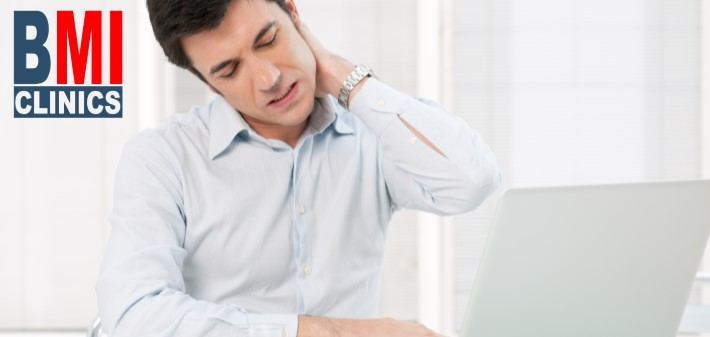The cervical spine (neck) is made up of vertebrae which extend from the skull to the upper torso. The cervical disks take in shock between the bones. The muscles, ligaments, and bones of your neck hold your head in position and allows motion. Any injury, inflammation, and abnormalities can lead to stiffness or neck pain.
Many individuals experience stiffness or neck pain regularly. In numerous cases, it is because of overuse, normal wear and tear, or poor posture. At times, neck pain can result from an injury sustained from a whiplash, contact sports, or a fall. In the majority of the cases, neck pain is not a severe condition and it can be relieved in just a few days. In other cases, neck pain can be an indication of a very serious illness or injury, and thus you may require urgent medical care. In case, neck pain persists for more than a week, is grave, or comes with other symptoms, you should urgently see a doctor.
Causes of Stiff Neck or Neck Pain
Neck pain can be induced by a number of factors:
1. Muscle Strain and Tension
This is typically due to behaviors and activities such as:
- Jerking the neck during physical exercises.
- Falling asleep with your neck in bad position.
- Working at your desk for an extended period of time without altering your position.
- Poor posture
2. Injury
The neck is principally susceptible to injury, particularly in sports, car accidents, and falls, where the ligaments and muscles of the neck are forced to move outside their standard range. In case the neck is fractured or dislocated, the spinal cord can also be impaired. Neck injury that is caused by abrupt jerking of the head is usually referred to as ‘whiplash’.
3. Conditions and Diseases
- Osteoporosis: It weakens bones and can lead to small fractures.
- Arthritis: It causes bone spurs, swelling of the joints, and pain. When these happen in the neck area, it can result to neck pain.
- Fibromyalgia is a condition which causes muscle pain all over the body.
As one age, the cervical disks continuously degenerate, narrowing the space found between the vertebrae and adding stress to the joints. In case a disk projects, it can add pressure to the nerve roots or spinal cord. This is referred to as a herniated cervical disk, and also called a slipped disk, or a ruptured disk.
Spinal stenosis happens when the spinal column becomes narrows and results in pressure on the spinal cord. This can be an outcome of a long-term inflammation caused by arthritis or other reasons.
Easing neck pain at home
In case you have a minor neck stiffness or pain, take these easy steps to get rid of it:
- Put some ice in the first few days on the part of your neck that is hurting. You can then apply heat with hot showers, hot compress, or heating pad.
- You can use over-the-counter pain relievers such as acetaminophen or ibuprofen.
- Take a few days off from heavy lifting, sports, and other activities which can aggravate your symptoms. You can resume the activities after the symptoms disappear.
- Exercise your neck daily. Gently stretch your head in up-and-down and side-to-side motions.
- Use a good posture.
- Desist from cradling the phone between your shoulder and neck.
- Make sure that you change your position as often as possible. Never sit or stand in one spot for very long.
- Go for a gentle neck massage.
- When sleeping, use a special neck pillow.
- Never use a neck brace or collar without first checking with your doctor. In case it is not used properly, this can really make the issue even worse.
When to See a Doctor
In case the symptoms continue for more than one week, you should see a physician. You should seek medical care if you have:
- Trouble breathing or swallowing
- Vomiting and nausea
- Swollen glands
- Headache
- Fever
- A lump in the neck
- Severe neck pain without obvious cause
- Weakness
- Tingling and numbness
- Pain which radiates down your legs or arms
- Inability to move your hands or arms
- Bowel or bladder dysfunction
- Incapability to touch your chin to your chest.
How Neck Stiffness or Pain is treated
Your physician will carry out a medical exam and record your complete medical history. Get ready to provide details about your symptoms, over-the-counter and prescription supplements and medications, and recent accidents or injuries, even if they seem unrelated.
Treatment of the pain will depend primarily on the diagnosis. Tests carried out to ascertain the cause of neck pain may include the following:
- Lumbar puncture
- Electromyography
- Magnetic resonance imaging
- Computed tomography
- X-rays
- Blood tests
Depending on the outcomes of these tests, your physician can refer you to different specialists.









